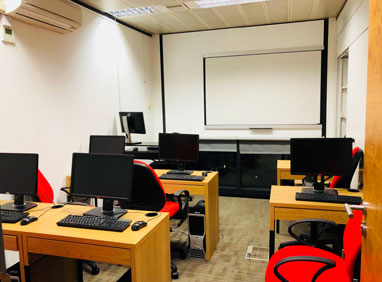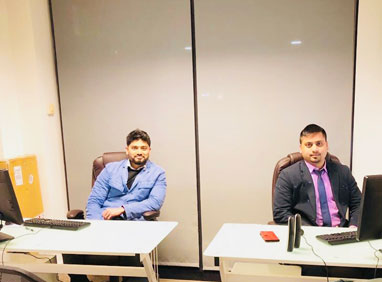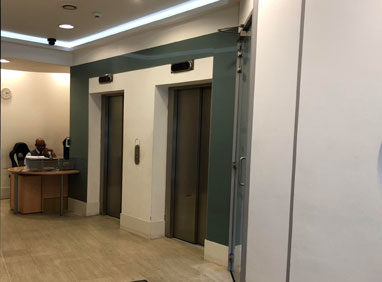Oracle Database 11g Training
Synopsis
- Fast Track (1 Week) – Mon to Fri (10:00-17:00)
Weekend Track (5 Weeks) – Every Sunday (10:00–17:00)
Evening Track (5 Weeks) – Every Mon & Wed (18:30–21:30) - Course Fee: £1500 + VAT
- Industry Expert and Certified Instructors
- Training Venue: Central London Location
- Tutor Led Classroom Training
Request Brochure
Attend Instructor Led Training From Anywhere
Course Information

Oracle the multinational company has its history since 1970 started from California. Oracle database technology is the most trusted and robust platform available in the market and it has very strong presence in database industry commanding greater market share.
Keeping data information on the computer without the centralized storage system and without the organized structure can be a mesh for the organizations. Thanks to the Oracle RDBMS system which will enable organizations to keep the data information secure, centralized, manageable and searchable. Capable of managing a smaller size to trillion records in one single database instance shows how powerful the Oracle Database system is.
With our Oracle 11g DBA certification you will learn from foundation of the database to advanced level to gain the certification. Precisely, you will learn database architect, database security, managing and maintaining tables, database performance tuning, Oracle Universal Installer, Database configuration assistant, Oracle Instance, Oracle Network Environment, Database Storage Structures, Database User Security, Oracle Flash recovery, ASM, Tablespaces, Flashback Technology, Managing Space, memory management and much more.
As a skill measure, Oracle has introduced "Oracle Certified Professional" Certification where one's skills can be measured and assured to the employers regarding their skills.
We are Oracle certified training centre in London. As a quality measure Oracle certification can only be achieved by doing the hands on course with Oracle Certified Training Center.
Career prospect
Oracle Database Administrator, Oracle Database Architect, Oracle Database Consultant.
Its market domination has created thousands of jobs in the market, making it the top database platform in the market. Due to its high market share there is huge demand of Oracle Database Administrators currently in the market.
How we deliver Oracle Database 11g course?
Our Oracle Database 11g OCP certification course is delivered by Oracle Certified Trainer an industry expert who have over 15 years of experience in Oracle Database Technology. We deliver Oracle Database 11g course hands-on, tutor led and classroom based training in Central London
Learning Facilities
We have immaculate learning facilities with state of art technology, fully equipped with high specs latest servers, workstations and software.
General Facilities
We also provide Free Wifi Internet, Refreshment, Water, Tea and Coffee Facilities.
Registration Process
Speak with course advisor about Oracle DBA course in London. Call us: 0207 256 7722
Course Fee: £1500 + VAT
- Hands-on Tutor Led Training
- Classroom Based Practical Training
- Unlimited Practice Lab Access
- Small Size Class and Interactive Sessions
- Lab Exercises
- Project Work
- WiFi Internet
- Refreshments
- Completion Certificate
- Free Re-training
- The course fee excludes VAT


Pay Monthly.
Interest Free Installments Upto 1 Year.
Contact
Oracle Database 11g Training
- Oracle OCA and OCP Exam 1Z0-051 Oracle Database 11g: SQL Fundamentals I
- Oracle OCA and OCP Exam 1Z0-052 Oracle Database 11g: Administration I
- Oracle OCA and OCP Exam 1Z0-053 Oracle Database 11g: Administration II
Course Syllabus
Oracle Database 11g: SQL Fundamentals I - Exam Number: 1Z0-051
Retrieving Data Using the SQL SELECT Statement
- List the capabilities of SQL SELECT statements
- Execute a basic SELECT statement
Restricting and Sorting Data
- Limit the rows that are retrieved by a query
- Sort the rows that are retrieved by a query
- Use ampersand substitution to restrict and sort output at runtime
Using Single-Row Functions to Customize Output
- Describe various types of functions available in SQL
- Use character, number, and date functions in SELECT statements
Using Conversion Functions and Conditional Expressions
- Describe various types of conversion functions that are available in SQL
- Use the TO_CHAR, TO_NUMBER, and TO_DATE conversion functions
- Apply conditional expressions in a SELECT statement
Reporting Aggregated Data Using the Group Functions
- Identify the available group functions
- Describe the use of group functions
- Group data by using the GROUP BY clause
- Include or exclude grouped rows by using the HAVING clause
Displaying Data from Multiple Tables
- Write SELECT statements to access data from more than one table using equijoins and nonequijoins
- Join a table to itself by using a self-join
- View data that generally does not meet a join condition by using outer joins
- Generate a Cartesian product of all rows from two or more tables
Using Subqueries to Solve Queries
- Define subqueries
- Describe the types of problems that the subqueries can solve
- List the types of subqueries
- Write single-row and multiple-row subqueries
Using the Set Operators
- Describe set operators
- Use a set operator to combine multiple queries into a single query
- Control the order of rows returned
Manipulating Data
- Describe each data manipulation language (DML) statement
- Insert rows into a table
- Update rows in a table
- Delete rows from a table
- Control transactions
Using DDL Statements to Create and Manage Tables
- Categorize the main database objects
- Review the table structure
- List the data types that are available for columns
- Create a simple table
- Explain how constraints are created at the time of table creation
- Describe how schema objects work
Creating Other Schema Objects
- Create simple and complex views
- Retrieve data from views
- Create, maintain, and use sequences
- Create and maintain indexes
- Create private and public synonyms
Oracle Database 11g: Administration I Exam Number: 1Z0-052
SQL Statements
- SELECT statement
- Differentiate between SQL statements and iSQL*Plus commands
Oracle Database Architecture
- Oracle Memory, Process and Storage Structures
Oracle Database Environment
- Oracle Database Administration
- Oracle Database Planning and installation
- Oracle Universal Installer (OUI), Oracle Database Installation
Oracle Database and Instance
- Create Oracle Database
- Database Configuration Assistant (DBCA)
- Manage Oracle Instance
- Initialization parameters
- Stages of database startup and shutdown
- Alert log and trace files
- Data dictionary and dynamic performance views
Oracle Network Environment
- Configure and Manage the Oracle Network
- Oracle Shared Server architecture
Oracle Database Storage Structures
- Manage Database Structures, Tablespace and datafiles
- Create and manage tablespaces
- Space management in tablespaces
Administering User Security in Oracle Database
- Create and manage database user accounts
- Grant and revoke privileges
- Create and manage roles
- Create and manage profiles
- Managing Schema Objects, Create and Modify tables
- Manage Constraints, Create indexes and use temporary tables
Undo Data
- Introduction to Undo data
- Transactions and undo data
- Managing undo
Data and Concurrency
- Manage data using DML
- Identify and administer PL/SQL objects
- Monitor and resolve locking conflicts
Oracle Database Security
- Manage Oracle Database security
- Principle of Least Privilege
- Standard Database Auditing
Oracle Database Maintenance and Performance Management
- Automatic Workload Repository (AWR), optimizer statistics,
- Use advisory framework, Alerts and Thresholds
- Automatic Memory Management and Memory Advisors
- Troubleshoot invalid and unusable objects
Intelligent Infrastructure Enhancements
- Enterprise Manager Support Workbench
- Managing Patches
Oracle Database Backup and Recovery
- Configure and manage Oracle Database Backup and Recovery
- Identify the types of failure that can occur in an Oracle database
- Describe ways to tune instance recovery
- Identify the importance of checkpoints, redo log files, and archived log files
Flash recovery area
- Configure ARCHIVELOG mode
- Step by step Database Backups
- Create consistent database backups
- Back up your database without shutting it down
- Create incremental backups
- Automate database backups
- Manage backups, view backup reports and monitor the flash recovery area
- Performing Database Recovery
- Oracle Data Recovery Advisor
- Oracle Data Recovery Advisor to Perform recovery (Control file, Redo log file and Data file)
Moving Data
- use methods to move data (Directory objects, SQL*Loader, External Tables)
- Architecture of Oracle Data Pump
- Data Pump Export and Import to move data between Oracle databases
Oracle Database 11g: Administration II Exam Number: 1Z1-053
Oracle Database Architecture and ASM
- Automatic Storage Management (ASM)
- Set up initialization parameter files for ASM and database instances
- Start up and shut down ASM instances
- Administer ASM disk groups
Configuring Oracle Database for Recoverability
- Configure multiple archive log file destinations to increase availability
- Define, apply and use a retention policy
- Configure the Flash Recovery Area, Use Flash Recovery Area
RMAN Recovery Catalog
- Identify situations that require RMAN recovery catalog
- Create and configure a recovery catalog
- Synchronize the recovery catalog
- Create and Use RMAN stored scripts
- Back up the recovery catalog
- Create virtual private catalog
Configuring Backup Specifications
- Configure backup settings
- Allocate channels to use in backing up, Configure backup optimization
Using RMAN to Create Backups
- Create image file backups, whole database backup
- Enable fast incremental backup
- Create duplex backup and back up backup sets
- Create an archival backup for long-term retention
- Create a multisection, compressed and encrypted backup
- Report on and maintain backups
User-Managed Oracle Database Backup and Recovery
- Recover from a lost TEMP file, lost redo log group
- Recover from the loss of password file
- Perform user-managed complete database recovery
- Perform user-managed incomplete database recovery
- Perform user-managed and server managed backups
- Identify the need of backup mode
- Back up and recover a control file
RMAN to Perform Recovery
- Perform complete recovery from a critical or noncritical data file loss using RMAN
- Perform incomplete recovery using RMAN
- Recover using incrementally updated backups
- Switch to image copies for fast recovery
- Restore a database onto a new host
- Recover using a backup control file
- Perform Disaster recovery
- RMAN to Duplicate a Database
- Creating a duplicate database
- Using a duplicate database
Performing Tablespace Point-in-Time Recovery
- Identify the situations that require TSPITR
- Perform automated TSPITR
Monitoring and Tuning RMAN
- Monitoring RMAN sessions and jobs
- Tuning RMAN
- Configure RMAN for Asynchronous I/O
Flashback Technology
- Restore dropped tables from the recycle bin
- Perform Flashback Query
- Flashback Transaction
- Flashback Operations
- Flashback Table operations
- Configure, Monitor Flashback Database
- Perform Flashback Database operations
- Set up and use a Flashback Data Archive
Diagnosing the Database
- Set up Automatic Diagnostic Repository
- Using Support Workbench
- Perform Block Media Recovery
Managing Memory
- Automatic Memory Management
- Manually configure SGA parameters
- Configure automatic PGA memory management
Managing Database Performance
- SQL Tuning Advisor
- SQL Access Advisor to tune a workload
- Understand Database Replay
Space Management
- Manage resumable space allocation
- Describe the concepts of transportable tablespaces and databases
- Reclaim wasted space from tables and indexes by using the segment shrink functionality
- Managing Resources
- database resource manager
- Create and use Database Resource Manager Components
Automating Tasks with the Scheduler
- Create a job, program, and schedule
- Use a time-based or event-based schedule for executing Scheduler jobs
- Create lightweight jobs
- Use job chains to perform a series of related tasks
- Administering the Scheduler
- Create Windows and Job Classes
- Use advanced Scheduler concepts to prioritize jobs
Globalization
- Customize language-dependent behavior for the database and individual sessions
- Working with database and NLS character sets
What Our Customers says

Course Attended:
Oracle Database 11g Training
Excellent course!Hajera
Course Attended:
Oracle Database 11g Training
Very professional, knowledgeable and patientPhilip
Course Attended:
Oracle Database 11g Training
Really good style, really good course. Exactly what I was looking for.Peter
Course Attended:
Oracle Database 11g Training
Very clear, engaging.Kevin
Course Attended:
Oracle Database 11g Training
Tailored the course to suit our individual knowledge and needsJames
Course Attended:
Oracle Database 11g Training
Trainer answered all my questions.kai
Course Attended:
Oracle Database 11g Training
Great teaching approach. Fantastic experience.Darren
Course Attended:
Oracle Database 11g Training
He was very good instructor and made the course very easyReginald
Course Attended:
Oracle Database 11g Training
Very helpful and made the course understandable, I felt I got everything I wanted from the courseMichael
Oracle Database 11g Training Package Offer: Great Savings!!!
Time Table and Pricing
Training Facilities










Training And Certification



Why Choose London Training ?
- Authorized Training Center
- Hands-on Training
- Tutor Led Classroom
- Small Class Size 5-7 max
- Central London Locations
- Expert and Certified Trainers
- Price includes Tuition Fee, Classroom Training and Course Material
- Expert and Certified Trainers
- Classes on Week Days, Evening or Weekends
- Free Re-training
- Modern Training Facilities
- Inclusive Books / Materials
- Mock Exams / Projects







